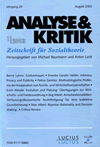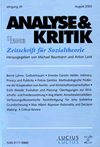Suchergebnisse
"Lukas Meyer"
Titel: Individual Expectations and Climate Justice
Autor: Lukas Meyer / Pranay Sanklecha
Seite: 449-471
Abstract: Many people living in highly industrialised countries and elsewhere emit greenhouse gases at a certain high level as a by-product of their activities, and they expect to be able to continue to emit at that level. This level is far above the just per capita level. We investigate whether that expectation is legitimate and permissible. We argue that the expectation is epistemically legitimate. Given certain assumptions, we can also think of it as politically legitimate. Also, the expectation is shown to be morally permissible but with major qualifications. The interpretation of the significance of the expectation is compatible with the understanding that historical emissions should count in terms of fairly distributing the benefits of emission-generating activities over people’s lifetimes but constrains the way in which we may collectively respond to climate change.
Titel: Comment on Lukas Meyer and Pranay Sanklecha: Individual Expectations and Climate Justice
Autor: Julian Culp
Seite: 473-476
Titel: Distributive Justice and Climate Change. The Allocation of Emission Rights
Autor: Lukas Meyer / Dominic Roser
Seite: 223-249
Abstract: The emission of greenhouse gases causes climate change. Therefore, many support a global cap on emissions. How then should the emissions allowed under this cap be distributed? We first show that above average past emissions cannot be used to justify a right to above average current emissions. We then sketch three basic principles of distributive justice (egalitarianism, prioritarianism, and sufficientarianism) and argue, first, that prioritarian standards are the most plausible and, second, that they speak in favour of giving people of developing countries higher emission rights than people of industrialised countries. In order to support this point it has to be shown, inter alia, in what ways the higher past emissions of industrialised countries are relevant for today’s distribution of emission rights.

The Relevance of Ideal Justice
2011 (33) Heft 2
Guest-Editors: Lukas Meyer / Pranay Sanklecha
Editorial
Whether and how normative theorising can be relevant for guiding people’s actions is one of the classical questions of moral and political philosophy. Platon’s dialogues Politeia, Politikos and Nomoi provide fascinating discussions on the topic. Recently normative theorists have investigated some aspects of these questions under the title of ideal and non-ideal theorising—relying on a distinction that Rawls introduced in A Theory of Justice (1971) and made use of in his The Law of Peo...

Ecological Goals and Liberal Ideals: Harmony or Conflict?
2006 (28) Heft 2
Guest-Editor: Thomas Schramme
Editorial
Liberty, equality, justice and solidarity are traditional political ideals of modern Western democracies. Different traditions and parties have supported different models in order to harmonise them. In contrast to the prevalence and long history of these values, ecological goals and needs have moved onto the political agenda fairly recently. Hence it should not come as a surprise that there is no consensus about the compatibility of ecological ambitions with common Western political ideals. Righ...